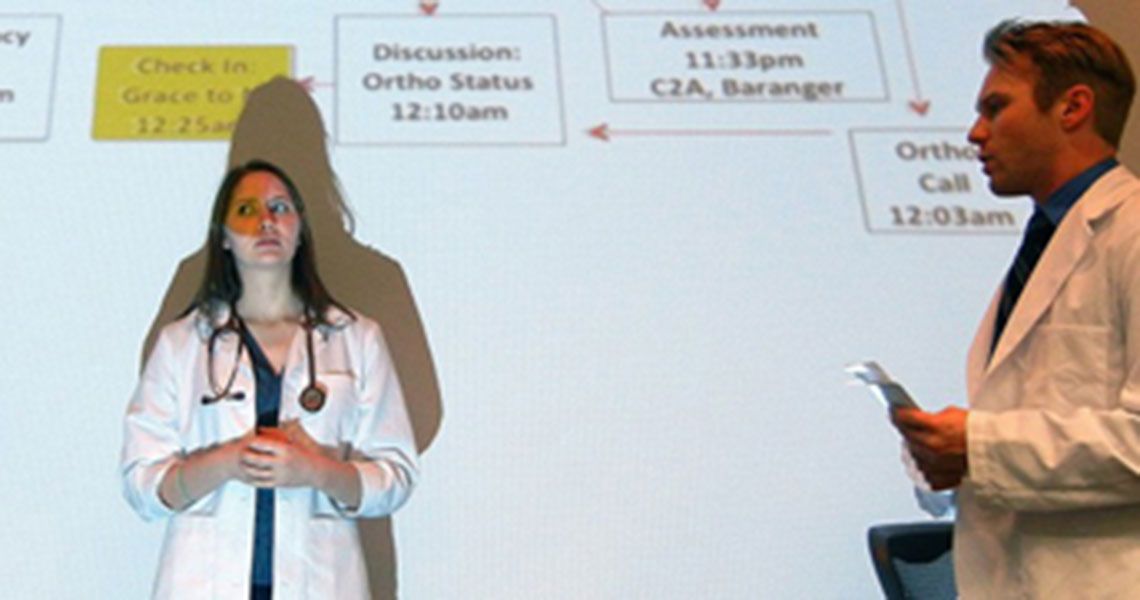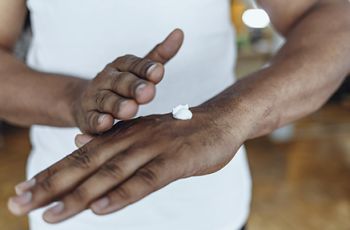Sometimes lessons are learned in ways that we’d least expect – information delivered in a unique and meaningful way tends to resonate more with students and faculty and makes the instruction stick. Professors at the George Washington University School of Medicine and Health Sciences (SMHS) are exploring new methods for faculty and student development, pairing the art of theater with lessons about professionalism, communication, conflict resolution, and teamwork, to make the material more pertinent and therefore more permanent.
Charles Samenow, M.D., M.P.H., assistant professor of psychiatry and behavioral sciences and associate director for medical student education in psychiatry, and Jeffrey Allen Steiger, a visiting scholar at SMHS, and the former director of the CRLT Theatre Program at the University of Michigan, have found that the unlikely partnership of theater and medical professionalism offers students and faculty an opportunity to step back and view common situations from a different vantage point. Through the principles of open dialogue and engagement, the practice allows participants to gain a new perspective, exposing old assumptions and beliefs through the lens of critical reflection. It’s called “transformative” learning, and research shows its principles can have a big impact on the behavior and attitudes of physician educators (Armstrong, 2003).
Samenow has published research on transformative learning (Academic Medicine) that supports the theory that practices such as interactive role-plays, have demonstrated behavioral change in physicians referred for disruptive behaviors.
In Samenow and Steiger’s theater in medicine program, a team of actors, some of whom have a background in health care, relay theories of professionalism through a series of performances dissecting common situations affecting both medical students and the medical professionals who work with them. The performances highlight day-to-day issues such as personal relationships, stress, and the ever-present competitiveness among practitioners in the medical profession, that affect a person as they learn and grow as clinicians.
One performance titled Milestones, is a dynamic, interactive multi-media production with a tailored curriculum focused on professionalism, burnout, and disruptive behaviors. Another titled The Lecture, features a series of short monologues that focus on the struggles facing basic science faculty trying to transition from traditional lectures to more interactive instruction that follows principles of adult and self-directed learning.
By highlighting teachable moments in the lives of medical students and medical professionals, Samenow and Steiger establish an atmosphere to support frank and lively discussions about the scenarios. So far, positive feedback from participants has been ample, noting the thought provoking approach of the program. Many faculty members say the sessions unearth long buried emotions from their own training days revealing the tremendous impression daily interactions can make on young trainees.
The response has been so positive, Samenow and Steiger have already expanded the project, offering the program to other medical institutions and working with clients including the Veteran’s Hospital, the Society for Education in Aesthesia, and Children’s National Medical Center.
“This series of performances provides a “safe” learning environment,” says Samenow. “As the program engages participants through reflection, dialog, and proactive strategies, it can re-align the way that participants view situations.”



